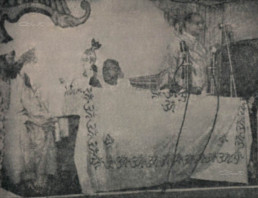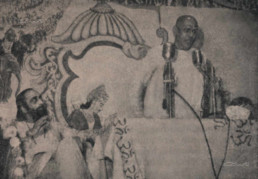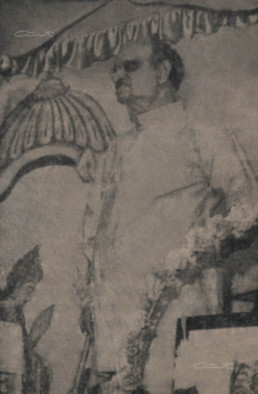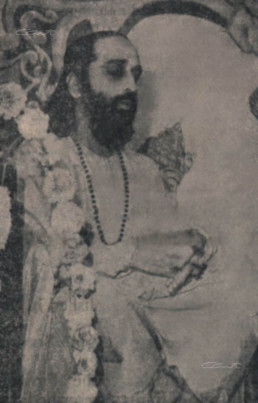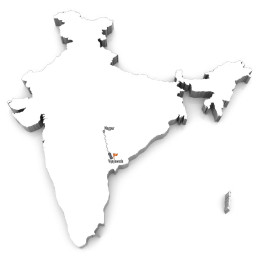
Jnana Yajna 75

Year & Dates:
October 16, 1960 to November 06, 1960

Yajna Topic:
Shrimad Bhagavad Gita- Chapter 3

Place:
Vijayawada, India.
Vijayawada, on the banks of the Krishna river in Andhra Pradesh, is famous for its sacred Kanaka Durga temple that overlooks the city from the Indrakeeladri hill. Its spiritual aspirants awaited Pujya Gurudev’s first Jnana Yajna in their city and had poured their hearts in erecting the yajnashala adorned in white and orange in the center of the Challapalli House premises. The dais with the Krishna-Arjuna Samvaad background and the prominent Om symbol stood ready for the Vedantic Master, as was the sanded floor with the palmyra mats for the sea of devotees.
The inauguration on the evening of October 16, 1960, was powerful because three spiritual stalwarts – Swami Pranavananda, Dr. Swami Gnanananda, and Pujya Gurudev Swami Chinmayananda graced the stage. Swami Pranavananda of Gudivada who taught Vedanta in Telugu and Sanskrit was the first to address the audience after Sri G. Subbaraju, the secretary of the yajna committee welcomed all.
Performing Work, Scientific and Divine
Swami Pranavananda first pointed out the ritualistic connotation of a yajna as oblations offered by householders in the sacrificial fire to please the gods. In comparison, he said, in the Gita Jnana Yajna, Pujya Gurudev was the yajna-karta as well as Adhyaksha, the preceptor; the gods who received the offering of knowledge were the seekers. Like the Om flag flying high in each yajna, he said the yajna’s purpose was to hoist Self-Knowledge in the hearts of the audience.
The scientist cum Vedantin, Dr. Swami Gnanananda, then spoke clarifying about the vision of scientists: “A true scientist recognises this divine presence, harmony in all his discoveries and the more he discovers the more he becomes constantly aware of His play.”
Starting on a humorous note, Pujya Gurudev observed that caught between the “champion of Sanaatana Dharma, Swami Pranavananda” and the very scientific (Dr.) Swami Gnanananda, between “jnana and pranava,” He was there to share the immortal words of Bhagavan Krishna in the Gita.
Apart from His forceful discourses on Karma Yoga since that evening, Pujya Gurudev taught Atma Bodha at 7 am in the mornings from October 21st. He expressed great reverence and admiration for its author – the spiritual missionary, prodigy and Advaitic Master Sri Adi Shankaracharya who re-established Hinduism in the face of atheistic challenges.
As the 75th yajna approached a fulfilling conclusion, Pujya Gurudev led the yatra to Machilipatnam and the sacred venue of Shivaganga nearby as a practical exercise in Karma Yoga. The yatra itself was a unique excursion with a dual viewpoint of science and spirituality. The devotees visited a pharmaceutical laboratory and a scientific equipment company; they had enlightening satsangs, avabruta snaana in the sea, darshan at Panduranga Mandir, the only temple in the state dedicated to Lord Panduranga Vittala in Chilakalapudi (a suburb of Machilipatnam), another invigorating satsang, and prayers at the powerful Jagatjanani temple in Sivaganga. A stopover at Pranavashram in Gudivada enabled all to also witness Pujya Gurudev’s reception by Swami Pranavananda.
Back in Vijayawada, in the final days of the 75th yajna, thousands of devotees were immersed in devotion while performing the Laksharchana of an attractive Bhagavan Krishna in the yajnashala.
In that glorious yajna where knowledge of action was understood and applied in divine outlets, Pujya Gurudev made the hearts of Vijayawada soar high like the Om flag above the yajnashala.
Photo Gallery
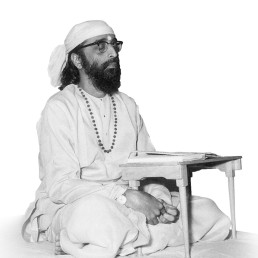
“Think,” Says Pujya Gurudev
Attachment becomes a clog or a painful chain on us only when it is extremely ego-centric. To the extent we work for larger schemes to bless a vast section of humanity, to that extent the attachment loses its poison and comes to bless the age. Many poisons serve as medicines in their diluted form, while the same in a concentrated form can bring instantaneous death! The ego and ego-centric desires bind and destroy man, but to the extent he can lift his identifications to include and accommodate in it larger sections of the living world, to that extent the attachment gathers an ethical hollow, a divine glow and becomes a cure for life’s subjective pains.
From Tyagi Magazine
Beware of these looters!
Likes and dislikes are universal, based on individual tendencies. Beware not to become enslaved by them, as they can hinder impartiality and inner growth. Maintain equipoise to avoid losing spiritual and moral wealth to the looters of prejudice.
